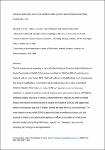Advocacy leadership and the de-professionalising of the Special Educational Needs Coordinator role
| dc.contributor.author | Done, E | |
| dc.date.accessioned | 2023-03-28T08:26:25Z | |
| dc.date.available | 2023-03-28T08:26:25Z | |
| dc.date.issued | 2022-12-31 | |
| dc.identifier.issn | 0952-3383 | |
| dc.identifier.issn | 1467-8578 | |
| dc.identifier.uri | https://pearl.plymouth.ac.uk/handle/10026.1/20638 | |
| dc.description.abstract |
The UK government is proposing to replace M-level National Award for Special Educational Needs Coordination (NASENCO) training, mandated for SENCos (SEN Coordinators) in England, with an unaccredited NPQ (National Professional Qualification). Such downgrading their level of qualification is intended to significantly increase the number of qualified SENCos, however, this is likely to reduce SENCos’ capacity to exercise ‘advocacy leadership’ in support of students at risk of marginalisation and social exclusion. We reject a neoliberal political discourse of continual improvement that neglects the need for critical literacy and research-informed inclusive practice on the part of SENCos, and suggest that endemic exclusionary practices in English schools are more likely to go unchallenged. The move towards non-accredited SENCo status risks their de-professionalisation, and this proposal is linked to an academisation agenda and efforts to normalise a trichotomised education system (comprising mainstream, ‘special’ and ‘alternative’ provision) by presenting such changes as an improvement. | |
| dc.format.extent | 197-218 | |
| dc.language | en | |
| dc.publisher | Wiley | |
| dc.subject | De-professionalisation | |
| dc.subject | Exclusion | |
| dc.subject | Inclusive education | |
| dc.subject | Neoliberalisation | |
| dc.title | Advocacy leadership and the de-professionalising of the Special Educational Needs Coordinator role | |
| dc.type | journal-article | |
| dc.type | Article | |
| dc.type | Early Access | |
| plymouth.issue | 2 | |
| plymouth.volume | 50 | |
| plymouth.publication-status | Published | |
| plymouth.journal | British Journal of Special Education | |
| dc.identifier.doi | 10.1111/1467-8578.12449 | |
| plymouth.organisational-group | |Plymouth | |
| plymouth.organisational-group | |Plymouth|Faculty of Arts, Humanities and Business | |
| plymouth.organisational-group | |Plymouth|Faculty of Arts, Humanities and Business|Plymouth Institute of Education | |
| plymouth.organisational-group | |Plymouth|REF 2021 Researchers by UoA | |
| plymouth.organisational-group | |Plymouth|Users by role | |
| plymouth.organisational-group | |Plymouth|Users by role|Academics | |
| plymouth.organisational-group | |Plymouth|REF 2021 Researchers by UoA|UoA23 Education | |
| dcterms.dateAccepted | 2022-11-20 | |
| dc.date.updated | 2023-03-28T08:26:25Z | |
| dc.rights.embargodate | 2023-2-14 | |
| dc.identifier.eissn | 1467-8578 | |
| rioxxterms.versionofrecord | 10.1111/1467-8578.12449 |


